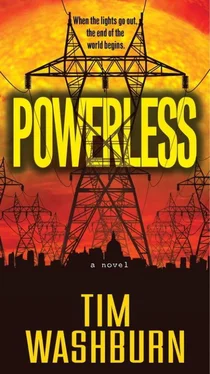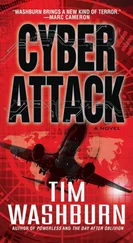“Sir, Admiral Hickerson is here.”
He sighs. “Send him in.”
Admiral Hickerson enters the office in his dress uniform and walks stiffly across the carpet. “Mr. President,” he says by way of greeting. There is no warmness in his words.
President Harris waves to the remaining chair. “Admiral, have a seat.”
He carefully sits, his shoulders erect, his bearing ever the military officer. The man’s weight probably hasn’t fluctuated more than five pounds during his thirty-year military career.
“Sir, I think we are reaching the point where we need to declare national martial law.”
The President stares at him but the admiral doesn’t shy away from the scrutiny.
“Why, Admiral? Are conditions deteriorating that quickly?”
“Yes, sir, they are. Unlike anything we could imagine. Some of our National Guard units are reporting casualties in the more densely populated areas. In addition, armories in Los Angeles, Philadelphia, and eastern New Jersey have been overrun, with God-knows-what weapons now on the street. I’ve had to beef up security at all facilities, leaving us awfully thin in manpower.”
“Christ,” the President mutters. “It’s only been a week, Admiral.”
“I understand, sir, but I believe it’ll get much worse. People are desperate and that desperation will increase exponentially with each passing day. If we are going to have any chance of containing the violence we need to declare martial law.”
President Harris takes a moment to digest the information, then turns his chair to face the windows. “Do you know, Admiral, that we, as a government, haven’t declared national martial law since the Civil War?”
“I wasn’t aware of that fact, sir. But if there was ever a time to do it again, that time is now.”
“What about active-duty troops?”
“Most of our forces are overseas and we don’t have the fuel to get them all home, much less their equipment. The training battalions scattered throughout the country are busy guarding their own bases. I believe it is imperative that we declare martial law, Mr. President.”
“How am I to inform the public their country is now a military state?” the President says, turning to face the admiral. “Hell, I can’t deliver any reliable messages to a majority of the people who depend on us to keep them safe.”
“Unfortunately, sir, we can’t notify the public. The only thing we can do is issue the order down the chain of command.”
“So, basically, Admiral, you’re asking for permission to turn our guns on our own people?” President Harris whispers.
“Nothing as dramatic as that, sir. But we do need to reestablish some sort of law enforcement. The vast majority of the people are kind and caring, willing to offer help when able to. It’s the ones that take whatever they want who need to be held in check.”
The Connor home, Upper West Side
Lara Connor is draped in blankets as she peers out the window of their sixth-floor apartment on West 69th Street. Disgusted, she turns away. “I saw another group of those whatever-the-hell-they-are—thugs, I guess,” she tells her husband, Greg.
He glances up from his book and nods, so that she knows he’s heard her. Otherwise, she is bound to repeat the statement until he offers some form of acknowledgment. They haven’t been out of each other’s presence for a solid week, and the little irritations between them are magnified with each passing hour. Not to mention the strain of living without electricity and running water in a sixth-floor apartment in the most densely populated city in the country.
The early warning from their daughter, Kaylee, had given them enough time to stock up on water and food—at least enough to last them a bit longer than others—but not enough time to escape the city.
“What are we going to do, Greg?”
Greg sighs and folds the book over his knee. “We don’t know how long the power is going to be off, Lara. It could come back on tomorrow.”
“Kaylee specifically said it might be a long time before the power comes back on. We can’t stay here, Greg. What are we going to do when the weather turns cold or when we run out of food? Join those roving gangs of delinquents, taking whatever we find?” Her fear, frustration, and hopelessness masquerading as anger—again.
Greg dog-ears the page of his book and lays it on the end table. He pushes up from the deep recesses of his favorite chair and walks over to the window. They aren’t blessed with sweeping views of the magnificent city—only their little corner near West 69th and Columbus Avenue. The nearly leafless trees provide a clearer picture of the busier of the two streets, but the only thing he can see are the cars parked pell-mell all around the building. The automobiles struggled for their last sip of gasoline and rest now, expired, in the middle of the now-useless street.
He stares out the window while absently rubbing the back of his neck. He turns and answers his wife’s question. “Do you wanna try to make a break for Wisconsin? I’d like nothing better, but how the hell are we going to get there, Lara?”
She plants her hands on her hips. “We can drive the car as far as it will go…” She pauses. “Then I guess we walk.” She immediately realizes how silly it sounds.
“Walk? Hell, Lara, we aren’t mountain climbers or hikers or outdoorsy people. We live in an apartment in the middle of New York City. And how are we going to drive? Haven’t you seen the street? We wouldn’t even be able to get the car out of the parking garage.” Greg pauses and takes a deep breath. “I’m sorry, Lara. I’m just fed up with the whole situation.”
Lara turns away.
Greg places his hand on her shoulder. “How about we walk the thirty or so blocks down to the Lincoln Tunnel to see if we would even be able to walk across to New Jersey?”
“You want to go now?”
“Yes, we can walk down and back before it gets dark.”
“What about all those hooligans roaming around?”
“If we stay in the recesses along the street we should be okay.”
Lara tucks a strand of gray hair behind her ear. “I don’t know, Greg.”
“C’mon,” he says, walking toward the coat closet near the door. “We could use some fresh air.”
“Okay… I guess. But don’t we need a weapon of some sort?”
“If we get to the point where a weapon is needed, we’re already in deep shit.”
The Sanders home, University Park, Dallas
Ruth Sanders stands in the nearly depleted pantry and throws her hands up. Dressed in a pair of running shorts and an old college T-shirt, with her shoulder-length dark hair tucked into a high ponytail, she grabs a couple of cans of SpaghettiOs. She blows away a layer of dust from the tops of the cans. She shakes the bread sack with her free hand and the faint rattle of bread crumbs only depresses her further. The peanut butter jar had been scraped clean yesterday, leaving a crude collection of odd canned goods that had lined the back of the pantry for months. She turns away before the tears can begin again.
Ruth had scrounged through the attic a couple of days ago in search of anything that might be of use and had stumbled across several cans of Sterno gel, left over from when they actually hosted parties in their home. She lights one now and slides it under the cookie-cooling rack she’s using for a stove top. After wiping the tops of the cans, she pierces the first lid with a recently discovered hand can opener and rotates the handle. The aroma wafting up from the grave of the interior forces her to turn her head to keep from gagging. She opens the other can and unceremoniously dumps the contents into a small pan and gives it a quick stir while holding her breath. Ruth shuffles over to the kitchen window to check on her children playing in the backyard.
Читать дальше












